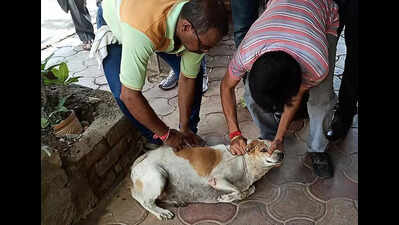- News
- City News
- nagpur News
- NMC Sterilises Nearly 40,000 City Stray Dogs In 21 months
Trending
NMC Sterilises Nearly 40,000 City Stray Dogs In 21 months
Nagpur: Averaging around 64 sterilisations per day, the Nagpur Municipal Corporation (NMC) sterilised nearly 40,000 stray dogs since launching its Animal Birth Control (ABC) programme in May 2023. The civic body engaged three NGOs to carry out the sterilisation procedures across designated centres in the city. As of Jan 2025, a total of 39,784 dogs — 20,363 males and 19,474 females — underwent sterilisation under this initiative.
To execute the large-scale sterilisation drive, the NMC appointed three NGOs — M/s Vets For Animal from Satara, which operates at the Bhandewadi centre, M/s Krishna Society for Animal, Pune, which runs sterilisation at the Gorewada centre, and M/s Swatantra Animal Welfare Society from Hyderabad, which is responsible for the Maharajbagh centre. These organisations have been carrying out surgeries on stray dogs as per guidelines to reduce canine population and mitigate the challenges associated with street dogs, such as rabies, territorial aggression, and bites.
The highest number of sterilisations was conducted by the Satara-based NGO, which carried out procedures on 20,250 dogs, including 9,759 males and 10,491 females from May 2023 to Jan 2025. The Pune-based NGO followed with 15,562 sterilisations, comprising 8,815 male and 6,747 female dogs (from Aug 2023 to Jan 2025). The Hyderabad-based NGO conducted a total of 4,025 sterilisations, covering 1,789 males and 2,236 females from Feb 2024 to Jan 2025.
The sterilisation programme is part of NMC's broader efforts to address the increasing stray dog population in Nagpur, which has been a growing concern among residents. The stray dog menace often led to complaints from citizens about attacks, road accidents, and the spread of zoonotic diseases. By systematically sterilising the stray dog population, the civic body aims to curb uncontrolled breeding and reduce conflicts between humans and street animals.
The ABC programme is being carried out under the guidelines of the Animal Welfare Board of India (AWBI) and is expected to continue until a significant reduction in the stray dog population is achieved. The NMC has also urged residents to support the initiative by reporting unsterilised stray dogs in their areas so that they can be picked up for the procedure.
With nearly 40,000 sterilisations completed, NMC's programme marks a significant step in addressing the city's stray dog issue. However, sustained efforts and monitoring will be crucial in ensuring the programme's long-term effectiveness and success in controlling the stray population.

About the Author
Proshun ChakrabortyEnd of Article
FOLLOW US ON SOCIAL MEDIA






